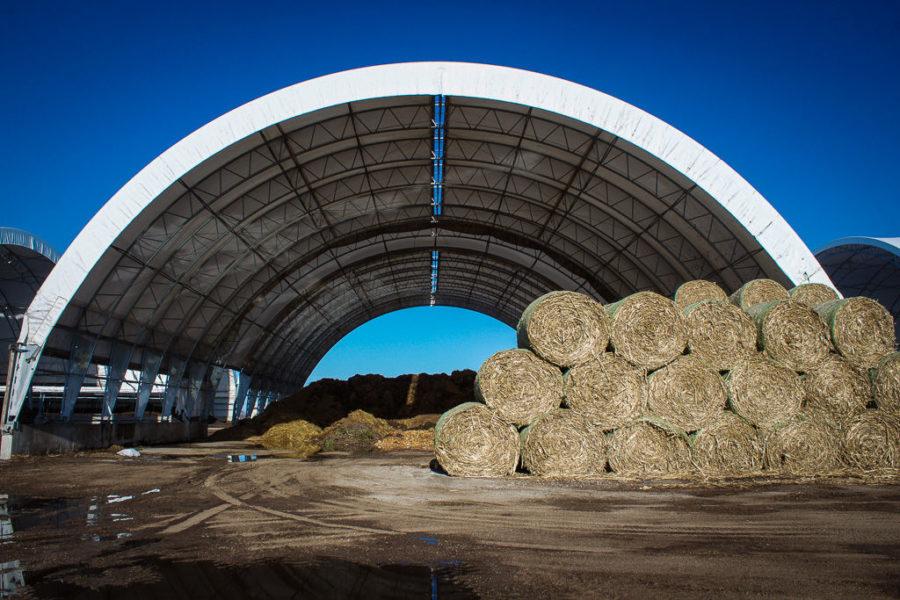- App Content
- App Content / News
- News
- News / Politics And Administration
- News / Politics And Administration / State
Trump administration’s $12 billion aid package to farmers raises concerns from Ames community members
Corn stalk is the main contributor to compost. Used for hay bales, corn stalk is recycled to feed livestock.
July 29, 2018
Farmers across the United States will receive an aid package of up to $12 billion to help with the falling prices of crops globally.
President Donald Trump announced this plan on July 24, which will provide relief from his increasing tariffs on overseas trade.
In a speech at a Veterans of War convention in Kansas City, Mo., Trump said farmers will be the biggest beneficiaries of the markets that will be opened by the tariffs he is imposing on foreign countries.
These tariffs, or taxes on imported goods, are Trump’s reaction to the $505.5 billion amount of imports the United States accepted from China, compared to the $129.9 billion that China accepted from the United States according to data collected by the Census Bureau.
As of July 20, $34 billion worth of Chinese products have been tariffed, but Trump stated in an interview with CNBC’s Joe Kernen that he is willing to raise those tariffs to $500 billion, which would essentially match the trade from the United States to China. In retaliation, China has matched the tariffs on goods coming from the United States.
“The president has heard from the agriculture workers that his tariffs are hurting them,” said Chad Hart, Iowa State associate professor of agricultural and natural resource economics, in relation to the relief package. “This shows that he recognizes that, and is providing money offset the low crop income.”
In the short term, farmers know they will be getting help from the government to cover significant losses during the fall harvest season. Hart said this is a mixed bag, however, as farmers would have preferred a long term solution of new trade deals with other countries which improve their profits.
The Iowa Farm Bureau Federation President Craig Hill also said in a statement on the Farm Bureau website, “the bottom line is that farmers prefer trade over aid.”
He continued, saying as costs to run farms and as global demand for Iowa crops grow, farmers will want global markets more than temporary aid. Hill said the Iowa Farm Bureau is looking forward to seeing when more details will be released, but in the meantime they are encouraging the Trump administration to end the tariffs on trade.
Iowa Gov. Kim Reynolds, a Republican, also made statements opposing the tariffs.
“The $12 billion in farm aid announced today will provide a short-term fix, but it’s not a long-term solution,” Reynolds said in a statement on July 24. “As I’ve said all along, nobody wins in a trade war. We must continue to expand and open markets, protect the Renewable Fuel Standard and allow Iowa products to be sold across the globe. Iowa farmers are the most productive in the world and will always win when they have unrestricted access to markets. I will never stop fighting for Iowa families affected by this trade war.”
By announcing the aid package, Hart said the Trump administration is likely indicating these tariffs, which have been going on for months, will continue through the end of 2018.
“Agriculture is a global market, once you go down the path of trading with the world, you don’t typically back out of it,” Hart said.
On July 25, Trump began talks of a new trade deal with the European Union, which ended the escalation of tariffs in most of Europe. Specifically, it stopped plans the tariffs the United States imposed on European steel and aluminum and the tariffs that the European Union imposed on cars and crops.
Hart said Iowa State will not be noticeably affected by the trade war, but the enrollment of students in the agriculture programs will typically follow the economic trends in agriculture, so there is a potential for a decay in enrollment in the college of agriculture. If there is an effect, he said, it will be small and unnoticeable.
Because of these tariffs, Hart said he will spend more time teaching his agriculture students about global trade and business practices to prepare them in case situations like this happen again in the future.
















